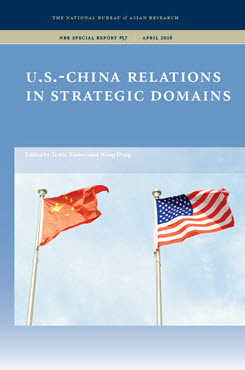
This NBR Special Report assesses U.S.-China relations in the maritime, nuclear, cyberspace, and space domains, as well as through the lens of people-to-people and military-to-military exchanges. Employing an innovative approach to represent both U.S. and Chinese perspectives, the members of the study team jointly examine opportunities for collaboration. Each essay identifies areas of divergence and convergence between U.S. and Chinese interests and recommends both cooperative initiatives and mechanisms to manage tensions.
The U.S.-China relationship is becoming increasingly complex and interdependent, and leaders in Beijing and Washington are struggling to establish a common foundation on which to expand and deepen bilateral relations. While both sides seem to agree on the general need to cooperate and manage competition, the details of how to move the relationship forward remain unclear, particularly in areas where progress has already been difficult to achieve. The international stakes of how the two nations work together and collaborate are monumental. Given that the global challenges facing the world today cannot be resolved without both the United States and China, calculations in the cyber, maritime, nuclear, and space domains are increasingly consequential and carry implications for other nations. Military-to-military (mil-mil) and people-to-people (P2P) interactions also have the potential to influence outcomes across a range of these and other key policy areas.
The National Bureau of Asian Research (NBR) and Peking University’s Institute for China-U.S. People-to-People Exchange partnered on a project to produce an examination of the challenges to establishing greater trust and cooperation in U.S.-China relations in strategic domains and bilateral exchanges. The project—”U.S.-China Relations in Strategic Domains”—assembled a study team of leading experts from China and the United States to develop a conceptual foundation for U.S.-China relations. Employing an innovative approach to represent both U.S. and Chinese perspectives, the members of the study team jointly examined opportunities for collaboration by identifying areas of divergence and convergence across four strategic domains and two modes of bilateral exchange. The project also enlisted two groups of senior advisors—composed of top scholars and current and former senior officials—who provided guidance and direction to the project and feedback to members of the study team.
The study team interacted and held discussions through seminars in Beijing and Honolulu, as well as through tele- and video conferences. The resulting essays published in this NBR Special Report assess the U.S.-China relationship in the maritime, nuclear, cyberspace, and space domains as well as through the lens of P2P and mil-mil exchanges. The project team sought to go beyond the rhetoric of cooperation to examine side by side U.S. and Chinese interests in each strategic domain and bilateral mode of exchange. Each essay identifies areas of convergence and recommends cooperative initiatives and mechanisms to manage tensions. The central challenge in improving strategic stability between the United States and China is finding ways to enhance collaboration and mitigate sources of tension. The project aims to help policymakers and strategists identify the terms and conditions through which the two sides can better understand one another, avoid conflict, and facilitate cooperation.
Travis Tanner is Senior Vice President and Chief Operating Officer of the 100,000 Strong Foundation.
Wang Dong is an Associate Professor in the School of International Studies at Peking University.
Note: NBR
Link: https://www.nbr.org/publication/introduction-u-s-china-relations-in-strategic-domains/
